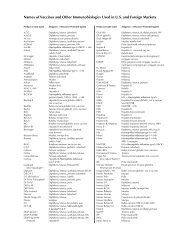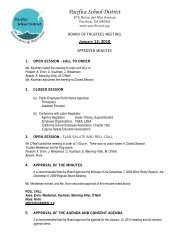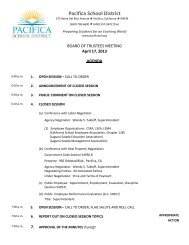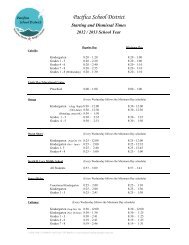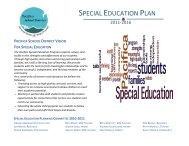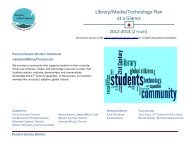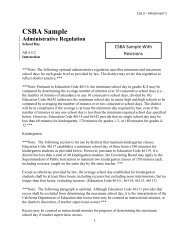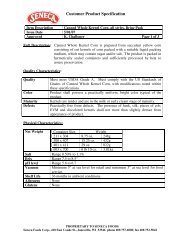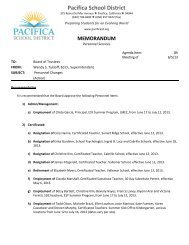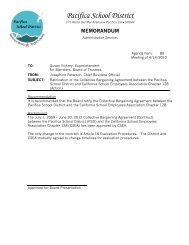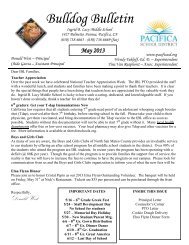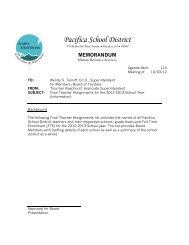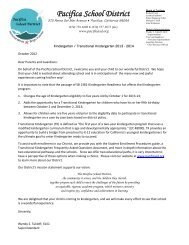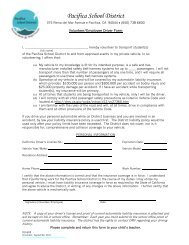CSBA Sample Second Reading Board Policy - Pacifica School District
CSBA Sample Second Reading Board Policy - Pacifica School District
CSBA Sample Second Reading Board Policy - Pacifica School District
Create successful ePaper yourself
Turn your PDF publications into a flip-book with our unique Google optimized e-Paper software.
<strong>Pacifica</strong> <strong>School</strong> <strong>District</strong><br />
375 Reina Del Mar Avenue • <strong>Pacifica</strong> CA • 94044<br />
MEMORANDUM<br />
Office of the Superintendent<br />
Agenda Item: 8g(1)<br />
Meeting of 9/12/12<br />
TO: <strong>Board</strong> of Trustees<br />
FROM: Wendy S. Tukloff, Ed.D.<br />
SUBJECT: <strong>Board</strong> <strong>Policy</strong> (BP) 1325: Advertising and Promotion<br />
(<strong>Second</strong> <strong>Reading</strong>)<br />
Recommendation<br />
It is recommended that the <strong>Board</strong> approve the <strong>Sample</strong> <strong>CSBA</strong> <strong>Board</strong> <strong>Policy</strong> (BP) 1325:<br />
Advertising and Promotion with revisions.<br />
Background<br />
The <strong>Board</strong> of Trustees held a First <strong>Reading</strong> on the above policy at the August 29,<br />
2012 <strong>Board</strong> meeting. There were no revisions to be made to the <strong>Board</strong> <strong>Policy</strong> after<br />
the first reading.
<strong>CSBA</strong> <strong>Sample</strong> <strong>Second</strong> <strong>Reading</strong><br />
<strong>Board</strong> <strong>Policy</strong><br />
Advertising And Promotion<br />
BP 1325<br />
Community Relations<br />
***Note: The following optional policy addresses the distribution of commercial and<br />
noncommercial materials by the district as well as advertising in school-sponsored publications<br />
and on school property. The personal distribution of materials by students is addressed in BP/AR<br />
5145.2 - Freedom of Speech/Expression. ***<br />
***Note: <strong>Board</strong>s should carefully consider whether they wish to establish a "closed forum" or a<br />
"limited open forum" regarding the distribution of materials at district schools. In a "closed<br />
forum," advertising would not be accepted in school-sponsored publications and materials from<br />
non-school-sponsored groups would not be distributed on school grounds. For example, the<br />
school could not distribute flyers from the local Girl Scout troop or Little League, nor could ads be<br />
accepted from businesses in the school yearbook. ***<br />
***Note: A "limited open forum" is a type of nonpublic forum intentionally opened to certain<br />
groups or certain topics. In a "limited open forum," school officials may impose reasonable<br />
restrictions on the distribution of materials or advertising and may selectively approve or<br />
disapprove materials or advertising as long as the decision is not arbitrary or capricious;<br />
restrictions must be viewpoint-neutral and reasonable in light of the purpose served by the forum<br />
(Lehman v. Shaker Heights, DiLoreto v. Downey Unified <strong>School</strong> <strong>District</strong>). In addition, districts<br />
may establish a "limited open forum" relative to student clubs, but a "closed forum" for<br />
advertising. See BP/AR 6145.5 - Student Organizations and Equal Access for language related to<br />
student clubs and the federal Equal Access Act. ***<br />
***Note: Option 1 is for use by districts that have established a "closed forum." Option 2 and<br />
the remainder of the policy are for use by districts that have established a "limited open forum."<br />
<strong>District</strong>s may establish different forums for different schools within the district (e.g., an<br />
elementary school may have a "closed forum"; a high school a "limited open forum") and the<br />
following policy should be modified accordingly. It's important to note that, when determining<br />
whether a district has established a "closed forum" or "limited open forum," courts would look<br />
beyond the district's intent as stated in its policy and also look to the actual practice of school<br />
officials (<strong>Board</strong> of Education of the Westside Community <strong>School</strong>s v. Mergens) Therefore, this<br />
policy should be applied in a consistent manner at each school. Because this is a complex and<br />
evolving area of law, it is strongly recommended that legal counsel be consulted prior to the<br />
adoption of policy in this area. ***<br />
Limited Open Forum<br />
The Governing <strong>Board</strong> desires to promote positive relationships between schools and community
organizations . The <strong>Board</strong> defines a “community organization” as a non-profit, tax-exempt<br />
organization (under IRS 501c) that is based in <strong>Pacifica</strong> or has an affiliate based in <strong>Pacifica</strong>. Just<br />
as community organizations can build support for the schools, the schools can cooperate with these<br />
groups under certain circumstances.<br />
In order to enhance community support and involvement in district schools the Superintendent or<br />
designee may approve:<br />
***Note: The district may select any or all of optional items #1-5 below to reflect the types of<br />
materials and/or advertising that it will allow. ***<br />
1. Distribution of noncommercial materials from community organizations that publicize<br />
services, special events, public meetings or other items of interest to students or parents/guardians<br />
(cf. 1400 - Relations Between Other Governmental Agencies and the <strong>School</strong>s)<br />
(cf. 5145.2 - Freedom of Speech/Expression)<br />
(cf. 6145.5 - Student Organizations and Equal Access)<br />
(cf. 6162.8 - Research)<br />
2. Distribution of materials of a commercial nature to students or parents/guardians that<br />
support the basic educational mission of the <strong>District</strong> ,and either directly benefit the students or are<br />
of intrinsic value to the students or their parents/guardians .<br />
(cf. 1700 - Relations Between Private Industry and the <strong>School</strong>s)<br />
3. Paid advertisements in school-sponsored publications, yearbooks, announcements and<br />
other school communications<br />
(cf. 1113 - <strong>District</strong> and <strong>School</strong> Web Sites)<br />
4. Products and materials donated by commercial enterprises for use in the classroom, as long<br />
as they serve an educational purpose and do not unduly promote any commercial activity or<br />
products. Such materials may bear the name and/or logo of the donor.<br />
(cf. 3290 - Gifts, Grants and Bequests)<br />
(cf. 6161.11 - Supplementary Instructional Materials)<br />
The <strong>Board</strong> believes that the students in our schools should focus on educational matters and not be<br />
the target of advertising or marketing. Except as specified in this <strong>Board</strong> <strong>Policy</strong>, the<br />
Superintendent or designee shall not accept promotional materials of a commercial nature for<br />
distribution, nor shall school-sponsored publications, announcements, or other communications<br />
carry advertising.<br />
Prior to distribution or publication, the Superintendent or designee shall review and approve all<br />
materials to ensure compliance with <strong>Board</strong> policy. Materials approved for distribution shall<br />
further the <strong>District</strong>’s intended purpose, directly benefit the students, support the basic educational
mission of the district, support a sense of community or be of intrinsic value to students.<br />
***Note: Generally, courts have upheld procedures that place reasonable "time, place and<br />
manner" restrictions on materials to be distributed, as long as the same restrictions were placed on<br />
all materials (Hemry v. <strong>School</strong> <strong>Board</strong> of Colorado Springs). <strong>District</strong>s might want to consider<br />
developing procedures that limit the "time, place and manner" of distributions, such as limiting<br />
distribution to before or after school hours or creating a central location for the distribution of all<br />
materials. Legal counsel should be consulted as appropriate. ***<br />
The Superintendent or designee may selectively approve or disapprove distribution of materials or<br />
publishing of copy based on the criteria listed below, but may not disapprove materials or copy in<br />
an arbitrary or capricious manner or in a way that discriminates against a particular viewpoint on a<br />
subject that would otherwise be allowed.<br />
All materials to be distributed shall bear the name and contact information of the sponsoring entity.<br />
***Note: <strong>District</strong>s might also consider requiring sponsoring entities to include a disclaimer on all<br />
materials to be distributed. For example, a disclaimer might state that "this event is not<br />
school-sponsored or approved" or that "opinions are not necessarily those of the school district or<br />
school personnel." <strong>District</strong>s wishing to include disclaimer language should consult legal counsel<br />
as appropriate. ***<br />
The use of promotional materials or advertisements does not imply district endorsement of any<br />
identified products or services. <strong>School</strong>s are encouraged to include a disclaimer in school<br />
publications and yearbooks stating that the school does not endorse any advertised products or<br />
services.<br />
Criteria for Approval<br />
The Superintendent or designee shall not accept for distribution any materials or advertisements<br />
that:<br />
1. Are obscene, libelous or slanderous (Education Code 48907)<br />
2. Incite students to commit unlawful acts, violate school rules or disrupt the orderly<br />
operation of the schools (Education Code 48907)<br />
***Note: Optional item #3 below prohibits the distribution of political materials or political<br />
advertising except under certain circumstances. Pursuant to Education Code 7058, the <strong>Board</strong> may<br />
conduct a political forum if it is made available to all sides on an equitable basis. ***<br />
3. Promote any particular political interest, candidate, party or ballot measure, unless such<br />
materials are being distributed at a forum in which candidates or advocates from all sides are<br />
presenting their views to the students during school hours or during events scheduled pursuant to<br />
the Civic Center Act
(cf. 1160 - Political Processes)<br />
(cf. 1330 - Use of <strong>School</strong> Facilities)<br />
(cf. 4119.25/4219.25/4319.25 - Political Activities of Employees)<br />
***Note: The law is unclear as to whether districts can prohibit the distribution of materials or<br />
advertising of a religious nature when materials of a non-religious nature are also distributed<br />
during school. Both the Ninth Circuit and <strong>Second</strong> <strong>District</strong> Court of Appeals, addressing different<br />
claims in DiLoreto v. Downey Unified <strong>School</strong> <strong>District</strong>, held that a California district's refusal to<br />
post a paid religious advertisement featuring the Ten Commandments on an athletic field fence<br />
where commercial advertising was permitted did not violate the free speech rights of the proposed<br />
advertiser when it was clear that the district did not open the forum (the fence) to all expressive<br />
activity. Both courts concluded that, regardless of whether or not the advertisement violated the<br />
Establishment Clause of the U.S. or California Constitutions, the district had the right to regulate<br />
content as a nonpublic forum. <strong>District</strong>s wishing to establish policy dealing with the distribution of<br />
religious materials should consult legal counsel. ***<br />
4. Discriminate against, attack or denigrate any group on account of any unlawful<br />
consideration<br />
(cf. 0410 - Nondiscrimination in <strong>District</strong> Programs and Activities)<br />
5. Promote the use or sale of materials or services that are illegal or inconsistent with school<br />
objectives, including but not limited to materials or advertisements for tobacco, intoxicants, and<br />
movies or products unsuitable for children<br />
6. Solicit funds or services for an organization, with the exception of solicitations authorized<br />
in <strong>Board</strong> policy<br />
(cf. 1321 - Solicitation of Funds from and by Students)<br />
7. Distribute unsolicited merchandise for which an ensuing payment is requested<br />
The Superintendent or designee also may consider the educational value of the materials or<br />
advertisements, the age or maturity of students in the intended audience, and whether the materials<br />
or advertisements support the basic educational mission of the district, directly benefit the students<br />
or are of intrinsic value to the students or their parents/guardians.<br />
(cf. 0000 - Vision)<br />
<strong>School</strong>s may establish additional criteria pertaining to the content of advertisements in school<br />
publications and yearbooks. Such criteria may limit advertisements to those that contain<br />
congratulatory or commemorative messages, curriculum-related content, advertisements for<br />
products or services of interest to students, noncontroversial content, and/or other content deemed<br />
appropriate by the school publication staff and adviser in accordance with law and <strong>Board</strong> policy.
Legal Reference:<br />
EDUCATION CODE<br />
7050-7058 Political activities of school officers and employees<br />
35160 Authority of governing boards<br />
35160.1 Broad authority of school districts<br />
35172 Promotional activities<br />
38130-38138 Civic Center Act<br />
48907 Student exercise of free expression<br />
BUSINESS AND PROFESSIONS CODE<br />
25664 Advertisements encouraging minors to drink<br />
U.S. CONSTITUTION<br />
Amendment 1, Freedom of speech and expression<br />
COURT CASES<br />
DiLoreto v. Downey Unified <strong>School</strong> <strong>District</strong>, (1999) 196 F.3d 958<br />
Yeo v. Town of Lexington, (1997) U.S. First Circuit Court of Appeals, No. 96-1623<br />
Hemry v. <strong>School</strong> <strong>Board</strong> of Colorado Springs, (D.Col. 1991) 760 F.Supp. 856<br />
Bright v. Los Angeles Unified <strong>School</strong> <strong>District</strong>, (1976) 134 Cal. Rptr. 639, 556 P.2d 1090, 18 Cal.<br />
3d 350<br />
Lehman v. Shaker Heights, (1974) 418 U.S. 298<br />
(6/92 6/96) 11/01



